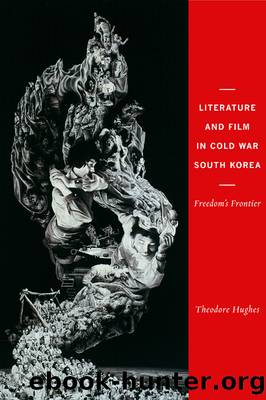Literature and Film in Cold War South Korea by Theodore Hughes

Author:Theodore Hughes [Hughes, Theodore]
Language: eng
Format: epub
Tags: Literary Criticism, Asian, General, History, Asia, Korea
ISBN: 9780231157490
Google: k-wYBQAAQBAJ
Publisher: Columbia University Press
Published: 2014-03-04T01:11:24+00:00
DEVELOPMENT AS DEVOLUTION
While the arrest and prosecution of Nam ChÅng-hyÅn following the publication of his âLand of Excrementâ (âPunji,â 1965) in North Korea is generally considered a significant event in postdivision South Korean literary history, Namâs works themselves have received relatively little critical attention.38 At the same time, Nam is often mentioned as a seminal, if problematic, figure in the narrative of increasing awareness of postdivision U. S. neoimperialism on the Korean peninsula. Kim Yun-sik, for example, writes that âNam ChÅng-hyÅnâs controversial âLand of Excrementâ demonstrates a new understanding of the United States, revealing with a powerful anger its essential character, that of the invader.â39 Im Chin-yÅng considers Namâs work the product of an era that was the âage of allegory, in other words, the age of authoritarian dictatorship.â40 Indeed, Namâs work in the early 1960s turns largely upon an allegorizing of the fall of the Syngman Rhee regime as an emancipatory moment that offered the promise of overcoming the neocolonial condition. Park Chung Heeâs May coup, by contrast, signals the return both of the repressive anticommunist state and the economic exploitation of the comprador elite and their foreign (U.S. and, later, Japanese) sponsors.41
Although Namâs texts of the early 1960s are explicit and specific responses to April 19 and May 16, they should also be seen in relation to the existentialist-inspired calls for social engagement (anggajyumang), resistance (rejisÅtâangsÅ), and action (haengdong) that began in the mid-1950s (Nam made his literary debut in 1958). As in many of his later works, the critique of the South Korean condition in Namâs early âInheritance Under the Chimneyâ (1959), for example, invokes the figure of the superfluous manâthe impoverished, college-educated young male intellectual who is precluded from participating meaningfully in society.
Nam differs from other writers such as Son Châang-sÅp Yi PÅm-sÅn, and Châoe In-hun who also deployed this figure in the late 1950s and early 1960s, however, in his close association of resistance with the body of the superfluous male protagonist standing in for the ethnonation. This biologizing of resistance should be located in the context of the relation between race and culture that occurred as part of the 1950s discourse on tradition (chÅntâong), itself, as we saw in the preceding chapter, a rearticulation of the late-colonial-period pan-Asian local/imperial subject standing against the âoccidentâ (sÅyang).42 Yi Ŭn-sangâs immanentist equation of race with culture to construct a Korea and Korean literature resistant to the modern (noted in chapter 3) finds further inflection in Sin Tong-hanâs âHumanism and the Spirit of the Authorâ (1959). In this article, Sin biologizes Sartrean anggajyumang, associated with existentialism in the 1950s, by linking it to the resisting national body:
Everyone knows that in Korea too there have been numerous historical instances of resistance. This tradition continues to flow as before in the blood vessels of the ethnonation [minjok Åi hyÅlmaek]. This bodily movement [momburim] to secure autonomous human subjectivity [ingan Åi chuchâesÅng] is, precisely, the spirit of humanism; it achieves expression through love of fatherland [choguk ae] and love of the ethnonation [minjok ae].
Download
This site does not store any files on its server. We only index and link to content provided by other sites. Please contact the content providers to delete copyright contents if any and email us, we'll remove relevant links or contents immediately.
The Power of Myth by Joseph Campbell & Bill Moyers(1057)
Half Moon Bay by Jonathan Kellerman & Jesse Kellerman(979)
Inseparable by Emma Donoghue(976)
A Social History of the Media by Peter Burke & Peter Burke(976)
The Nets of Modernism: Henry James, Virginia Woolf, James Joyce, and Sigmund Freud by Maud Ellmann(900)
The Spike by Mark Humphries;(809)
The Complete Correspondence 1928-1940 by Theodor W. Adorno & Walter Benjamin(783)
A Theory of Narrative Drawing by Simon Grennan(775)
Culture by Terry Eagleton(771)
Ideology by Eagleton Terry;(733)
World Philology by(712)
Farnsworth's Classical English Rhetoric by Ward Farnsworth(711)
Bodies from the Library 3 by Tony Medawar(708)
Game of Thrones and Philosophy by William Irwin(707)
High Albania by M. Edith Durham(699)
Adam Smith by Jonathan Conlin(687)
A Reader’s Companion to J. D. Salinger’s The Catcher in the Rye by Peter Beidler(686)
Comic Genius: Portraits of Funny People by(649)
Monkey King by Wu Cheng'en(647)
